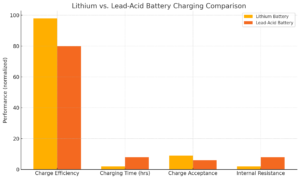Lead-acid batteries take hours to charge, and sometimes that delay affects real operations. If you’ve ever needed a quick turnaround, lithium is clearly better.
Lithium batteries charge faster than lead-acid because of lower internal resistance, higher charge acceptance rate, and smarter charge control.
When I replaced our office backup system with lithium, I saw charging times drop by over 60%. That meant we could resume operations faster after power outages.
What Makes Lithium Batteries Charge Faster?
What's the science behind lithium's fast charging?
The main difference lies in battery chemistry and design. Lithium-ion cells are more efficient at accepting charge.
| Feature | Lithium Battery | Lead-Acid Battery |
|---|---|---|
| Charge Efficiency | 95–99% | 70–85% |
| Charging Time (0–100%) | 1.5–3 hours | 6–12 hours |
| Charge Acceptance Rate | High | Moderate |
| Internal Resistance | Low | High |
Lithium’s low resistance reduces heat loss, which improves both charging speed and energy use.

How Do Lithium Charging Stages Differ?
What are the main charging phases?
Both lithium and lead-acid batteries follow stages, but lithium goes through them faster and more efficiently.
Lithium Charging Phases
- Constant Current (CC) – full current until target voltage is reached
- Constant Voltage (CV) – voltage held while current tapers
- Cutoff – charging stops automatically when current falls below threshold
Lead-Acid Charging Phases
- Bulk – constant current
- Absorption – current gradually drops while voltage stays constant
- Float – low trickle charge to keep battery full
Lead-acid’s absorption and float stages are much longer. Lithium skips the float stage, reducing total time.
Why Does Charge Efficiency Matter?
Is lithium charging more energy-efficient?
Yes. Lithium batteries waste less energy during charging. That means:
- Faster recharge cycles
- Less heat generation
- Lower electricity usage
This is especially important for solar and off-grid setups where energy is limited.
How Does Smart Charging Help?
Do lithium batteries support better charge control?
Modern lithium battery systems include built-in BMS (Battery Management System) and smart inverters:
- Automatically stop charging when full
- Adjust charge rate based on temperature or cell health
- Protect against overvoltage or undervoltage
Lead-acid systems usually require manual monitoring or simpler controllers.
Conclusion
Lithium batteries charge faster than lead-acid because of their superior chemistry, lower resistance, and smarter electronics. They're better for modern solar, backup, and high-demand applications.
SANKE lithium batteries support fast, safe charging with integrated BMS and high-efficiency cells. Factory-direct, over 5000 cycles, and truly cost-effective.



